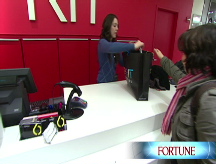Stocks in the bargain bin
Investor Daily: Consumer staple stocks are usually a good bet in a recession - if you know when to get out.
NEW YORK (Fortune) -- The advice that everyone gets during a recession is to move your portfolio into defensive stocks, namely consumer staples. As we head deeper into the economic doldrums is that still the right move?
A few months ago, it would've been sound advice. The best-performing consumer staples exchange-traded fund, the Consumer Staples Select Sector SPDR (XLP), which tracks stocks of food, beverage, cosmetics, basic retail and other consumer necessities, is down 15% year to date versus a 44% decline for the S&P 500.
But history doesn't predict the future, and analysts are saying that the sector's price-to-earnings multiples are now relatively expensive. In other words, consumer staples shares won't outperform the rest of the market during the recession, even if some individual companies do benefit from global belt-tightening. If you've moved into consumer staples funds, it's time to get out.
Citigroup strategist Lori Calvasina has studied the performance of mid-cap consumer staples in the previous four recessions. "There are two phases of performance," she said. "How the sector performs early in the recession, before the bottom, and how it performs after that point. Staples tend to lag the market going back up. The question you've got to answer is, 'where do I think we are in the cycle?' "
Calvasina and her team at Citigroup think we're nearing the mid-point in the recessionary cycle, and so have advised clients to stop shifting money into the consumer-staples sector. The prices for these companies, they argue, are too high: Staples are priced at about 1.3 times the price-to-earnings ratio of the broader market, according to Citigroup's figures.
"You've had some decent out-performance," continued Calvasina, "but you get to a point where these become crowded trades," meaning that everyone is trying to execute the same game plan at once, thus driving up prices beyond the point where the strategy makes sense.
But for the more adventurous, who don't mind playing the market beyond broad sector funds, there are still bargains to be found. The sector funds, like Vanguard's Consumer Staples ETF (VDC), include good buys like Wal-Mart (WMT, Fortune 500), up 12% so far in 2008. (The top performer is Anheuser-Busch (BUD, Fortune 500), up 28% due to the anticipated buyout by InBev (ABI).) But they also have stinkers like Whole Foods, which is down 76%, and Tyson Foods, down 61%. The passive indexes don't pass judgment on what's truly a staple and what, in reality, proves to be discretionary.
Parsing the differences between consumer staples companies is tricky. In two recent reports on food and drug retail, Barclays Capital retail analyst Meredith Adler identifies which industry players are likely to under- and out-perform during the next quarter. Within supermarkets, the more discount oriented chains - like Costco (COST, Fortune 500) and Supervalu (SVU, Fortune 500) - are poised to be winners, taking customers from more upscale chains like Whole Foods (WFMI, Fortune 500) and even Wal-Mart, whose supercenters selling cheap groceries will be fine but whose discount centers focused on electronics and housewares might suffer.
Consumer staples companies are also sometimes a zero-sum game. What's good for a supermarket, for example, isn't necessarily good for food companies. Many consumers aren't reluctant to switch from branded goods to private-label or generics when things get really bad. Supermarket chains like Kroger and Safeway have reported increases in private-label sales at the expense of brands like Campbell Soup (CPB, Fortune 500) and General Mills (GIS, Fortune 500). Even within companies, some products win at the expense of others.
Investors also need to pay attention to companies' international exposure. While shares of tobacco-maker UST (UST) (formerly U.S. Tobacco) and Philip Morris International (PM) have outperformed among consumer staples, due in part to strong overseas sales growth, they are both vulnerable to currency-price fluctuations that can impact earnings. The same goes for all-weather brands like Nike (NKE, Fortune 500) and Coca-Cola (KO, Fortune 500), as a previous Investor Daily column explained.
Company-specific factors, too, can have big impact. Barclays's Adler is overweight on CVS (CVS, Fortune 500) but only equal-weight Walgreen's (WAG, Fortune 500). Both are poised to benefit from the steady sales that pharmacies generate, but Walgreen's is going through a painful restructuring, while CVS has proven itself to be capable of managing the heavy debt load it carries.
Even within staples, bargain hunting is still the name of the game. Don Wordell, who manages the mid-cap value fund RidgeWorth for SunTrust, likes Sara Lee (SLE, Fortune 500), which is down 40% on the year. "It's going through massive restructuring," he said, "They're pulled back right now, for liquidity purposes, but they're building global brands and selling non-core assets."
So, is it time to move in the other direction, into consumer discretionary categories like luxury goods, electronics and restaurants?
History suggests so. Calvasina of Citigroup is suggesting increasing your holdings in the discretionary sector. As you might expect, her research also found that while staples underperform in the later part of a recession, discretionary overperform. While it might not feel like we're at the bottom of this mess yet, keep in mind that the market typically moves faster than economic reality. After all, it was only on Monday that the recession was officially declared.
If all of this shifting around feels like market timing, that's because that's what it is. But if you've already moved into defensive stocks, you've got to be willing to call the bottom and move in the other direction at some point. Like we've said many times, active investing is never for the faint of heart. ![]()
-
 The retail giant tops the Fortune 500 for the second year in a row. Who else made the list? More
The retail giant tops the Fortune 500 for the second year in a row. Who else made the list? More -
 This group of companies is all about social networking to connect with their customers. More
This group of companies is all about social networking to connect with their customers. More -
 The fight over the cholesterol medication is keeping a generic version from hitting the market. More
The fight over the cholesterol medication is keeping a generic version from hitting the market. More -
 Bin Laden may be dead, but the terrorist group he led doesn't need his money. More
Bin Laden may be dead, but the terrorist group he led doesn't need his money. More -
 U.S. real estate might be a mess, but in other parts of the world, home prices are jumping. More
U.S. real estate might be a mess, but in other parts of the world, home prices are jumping. More -
 Libya's output is a fraction of global production, but it's crucial to the nation's economy. More
Libya's output is a fraction of global production, but it's crucial to the nation's economy. More -
 Once rates start to rise, things could get ugly fast for our neighbors to the north. More
Once rates start to rise, things could get ugly fast for our neighbors to the north. More









